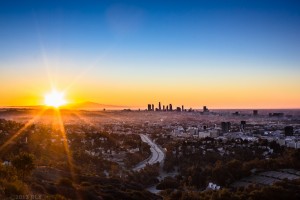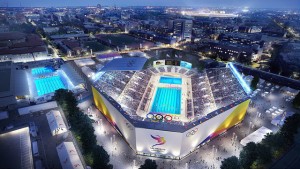
The sun rises over Los Angeles, one of the bid cities for the 2024 Olympic Games. Photo: Flickr
The Summer Olympics holds the promise of world-class competition, human achievement, and international prestige – not just for athletes, but for host cities, too. Every four years, the world watches as an Olympic host city spends billions of dollars to prepare for the largest athletic event in the world. Just like the athletes, the host city suffers wins and losses. While host cities can benefit from increased tourism, they are notorious for overspending in their quest for Olympic acclaim, and the economic and social benefits they hope to achieve are often short-lived and unfelt by local residents, as was the case in Rio de Janeiro for the 2016 Games.
But with its 2024 Olympic bid, Los Angeles is reimagining what an Olympic Games could mean for urban development in a modern city. With a strong emphasis on environmental and financial sustainability, a Los Angeles Olympics aims to transform the car-centric, polluted city into a model of sustainability.
Los Angeles is tapping into its existing resources to minimize costs and maximize gains. Rather than fully fund a city-wide transformation on its own, the city is heavily utilizing private investors for financial and infrastructural resources. Many of its plans for energy and transportation infrastructural improvements listed in the bid are already underway with funding from the US federal government. As a result, the Los Angeles has been able to keep its proposed budget unprecedentedly low — its $5 billion proposal is a fraction of the $42 billion spent on the 2008 Beijing Games and the $20 billion dollars spent to prepare for Tokyo’s 2020 Games.
A major world city that has hosted the Olympics twice before in 1936 and 1984, Los Angeles already has 98% of the existing arenas and venues – both public and private — that it needs to host the Olympic events. Some sporting arenas will receive permanent renovations and improvements, while others will receive temporary renovations. For example, temporary pools will be installed in USC’s baseball stadium to host the swimming events rather than build a whole new swimming facility that would get little use in the coming years.
In addition to these temporary installations, Los Angeles will also build temporary buildings for certain events, which are a cheaper and less impactful alternative to permanent stadiums. Venues like a beach volleyball stadium on Santa Monica Beach would be constructed in modular materials that can dismantled after the event and reused by the city in the for future. London successfully used temporary structures of steel and concrete in 2012 to supply additional spectator seating and kiosks for food vendors and other spectator services.

Digital rendering of the USC’s Dedeaux Field with a temporary swimming pool installation. Photo: LA Times
Los Angeles is not unique in its focus on sustainability. Since the International Olympic Committee adopted a commitment to environmental sustainability in its Olympic Charter in 1999, Olympic host cities have increasingly featured sustainable goals. In 2008, China took steps to offset the carbon emissions released by construction and promoted energy efficient building construction and renewable energy sources. London took sustainable initiatives further in 2012, promoting the recycling of rainwater and a successful zero-waste campaign.
For 2024, Los Angeles wants to take sustainability to an unprecedented level. Taking its Olympic slogan, “Follow the Sun,” to heart, Los Angeles plans to tap into its iconic sunny weather and expand its solar capacity to host the first energy-positive Games in history.
It’s a huge goal, but it might be possible. Los Angeles currently sources 23% of its energy from renewable sources, and its Department of Water and Power is already working to expand its solar infrastructure so that 50% of its energy comes from renewables by 2030. If it wins the Olympic bid, Los Angeles would expedite its sustainable energy plan to increase energy efficiency and renewable capacity for 2024. Although a large investment, a renewable energy infrastructure would dramatically cut operation costs and the carbon footprint of the Games, and continue being an asset to the city long into the future.
Los Angeles has long desired an overhaul of its transportation system as well. In 2009, the city launched a 30-year plan to dramatically expand its public transit infrastructure. If Los Angeles won the Olympic bid, the city could draw on billions of dollars of federal funds it received for its long-term plan to expedite expansions of its metro, commuter rail, and bus systems in time for 2024. This rapid change would come at a time when citizens are hungry for better transportation access. In fact, this past November, the city voted to increase sales tax to fund such improvements.
Pollution problems have made past Olympic sites controversial, such as Beijing’s air pollution in 2008 and the raw sewage and garbage in Rio’s Guanabara Bay in 2016. While the Los Angeles Olympic bid does not explicitly address how it will tackle its air quality problems, its emphasis on reducing cars on the road will also reduce the amount of harmful emissions in the air. To address its low air quality problem in the short term, Los Angeles could invest more funds in its nascent bike path network to connect the flat cityscape. Not only would it take cars off the road, reducing congestion and providing a fossil-free transit option, but Los Angeles’ mild weather is ideal for encouraging a year-round biking culture.
While the bids other two Olympic city candidates – Paris and Budapest – propose sustainable measures, Los Angeles’ goals are ones that the city has been working towards long before this Olympic bid. This alignment with currently existing initiatives and goals is not just a quality that differentiates Los Angeles from its competitors, but one that radically sets Los Angeles apart from bids in Olympic history.
Los Angeles will continue to revitalize its infrastructure whether or not its bid is successful, but a successful bid and international pressure would push Los Angeles to develop its city more rapidly and on a larger scale that it would on its own. The benefits of such sustainable development measures would spread out to the rest of the country, with Los Angeles showing other American cities that smart, thoughtful, and sustainable development is not only possible, but it is positive and desirable. A 2024 Olympic legacy could stretch beyond US borders, too, providing future Olympic cities with roadmap for how to design an Olympic strategy that will transform a city for good.
